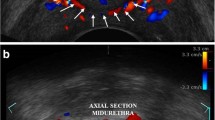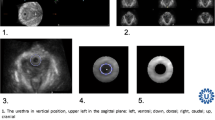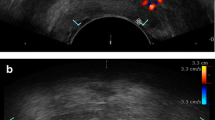Abstract
Purpose
To assess the vascular parameters in the urethra of nulliparous females and to compare the vascularity among various parts of the urethra, using high-frequency endovaginal ultrasonography (EVUS).
Methods
Twenty-two nulliparous women, mean age 27 years, underwent EVUS using a biplane transducer at 12 MHz frequency. Color Doppler examinations of the urethra were recorded and further evaluated off-line using special software (Pixel Flux) for quantitative assessment of the vascularity. The urethra was divided into four regions of interest (ROIs) in the midsagittal plane and three ROIs in the axial plane. The following parameters were measured: velocity (V), perfused area (A), perfusion intensity (I), pulsatility index (PI), and resistance index (RI). Interobserver and intraobserver reproducibility analysis was also performed.
Results
In midsagittal plane, the midurethra presented the highest value of V and lowest value of A. The intramural part showed the lowest value of I and the highest values of RI and PI. In the distal urethra, the highest value of I and the lowest value of RI was seen. In the axial plane, the values of V, A, and I were statistically significantly higher in the external part of the midurethra compared with the internal part. Excellent interobserver and intraobserver reproducibility was shown in the majority of parameters for the entire urethra.
Conclusions
Vascularity differs in different parts of the urethra. Pixel Flux is a valuable tool for providing reproducible quantitative analysis of vascular parameters for the entire urethra.


Similar content being viewed by others
References
Ashton-Miller JA, DeLancey JO (2007) Functional anatomy of the female pelvic floor. Ann NY Acad Sci 1101:266–296
Caine M (1986) Peripheral factors in urinary continence. J Urol (Paris) 92(8):521–530
Jackson SR, Brookes S, Abrams P (2000) Measuring urethral blood flow using Doppler ultrasonography. BJU Int 86(7):910–917
Siracusano S, Bertolotto M, d’Aloia G, Silvestre G, Stener S (2001) Colour Doppler ultrasonography of female urethral vascularization in normal young volunteers: a preliminary report. BJU Int 88(4):378–381
Dietz HP (2004) Ultrasound imaging of the pelvic floor. Part I: two-dimensional aspects. Ultrasound Obstet Gynecol 23:80–92
Santoro GA, Wieczorek AP, Stankiewicz A, Wozniak MM, Bogusiewicz M, Rechberger T (2009) High-resolution three-dimensional endovaginal ultrasonography in the assessment of pelvic floor anatomy: a preliminary study. Int Urogynecol J Pelvic Floor Dysfunct 20(10):1213–1222
Wieczorek AP, Wozniak MM, Stankiewicz A, Santoro GA, Bogusiewicz M, Rechberger T (2010) 3-D high-frequency endovaginal ultrasound of female urethral complex and assessment of inter-observer reliability. Eur J Radiol [Epub ahead of print]
Scholbach T, Girelli E, Scholbach J (2006) Tissue pulsatility index: a new parameter to evaluate renal transplant perfusion. Transplantation 81(5):751–755
Scholbach T, Girelli E, Scholbach J (2005) Dynamic tissue perfusion measurement: a novel tool in follow-up of renal transplants. Transplantation 79(12):1711–1716
Scholbach T (2007) From the nutcracker-phenomenon of the left renal vein to the midline congestion syndrome as a cause of migraine, headache, back and abdominal pain and functional disorders of pelvic organs. Med Hypotheses 68(6):1318–1327
Bump RC, Mattiasson A, Bo K, Brubaker LP, DeLancey JO, Klarskov P et al (1996) The standardization of terminology of female pelvic organ prolapse and pelvic floor dysfunction. Am J Obstet Gynecol 175(1):10–17
Scholbach T, Dimos I, Scholbach J (2004) A new method of color Doppler perfusion measurement via dynamic sonographic signal quantification in renal parenchyma. Nephron Physiol 96(4):99–104
Wieczorek AP, Woźniak MM, Stankiewicz A, Bogusiewicz M, Santoro GA, Rechberger T et al (2009) The assessment of normal female urethral vascularity with Color Doppler endovaginal ultrasonography: preliminary report. Pelviperineology 28:59–61
Santoro GA, Wieczorek AP, Shobeiri SA, Mueller ER, Pilat J, Stankiewicz A, Battistella G (2011) Interobserver and interdisciplinary reproducibility of 3D endovaginal ultrasound assessment of pelvic floor anatomy. Int Urogynecol J Pelvic Floor Dysfunct 22(1):53–59 Epub 2010 Aug 11
Santoro GA, Wieczorek AP, Dietz HP, Mellgren A, Sultan AH, Shobeiri SA, Stankiewicz A, Bartram C (2011) State of the art: an integrated approach to pelvic floor ultrasonography. Ultrasound Obstet Gynecol 37(4):381–396. doi:10.1002/uog.8816 (Review)
Wieczorek AP, Stankiewicz A, Santoro GA, Woźniak MM, Bogusiewicz M, Rechberger T (2011) Pelvic floor disorders: role of new ultrasonographic techniques. World J Urol [Epub ahead of print]
Bland JM, Altman DG (1986) Statistical methods for assessing agreement between two methods of clinical measurement. Lancet ii:307–310
Macura KJ, Genadry R, Borman TL et al (2004) Evaluation of the female urethra with intraurethral magnetic resonance imaging. J Magn Reson Imaging 20:153–159
Digesu GA, Robinson D, Cardozo L et al (2009) Three-dimensional ultrasound of the urethral sphincter predicts continence surgery outcome. Neurourol Urodyn 28:90–94
Tunn R, Petri E (2003) Introital and transvaginal ultrasound as the main tool in the assessment of urogenital and pelvic floor dysfunction: an imaging panel and practical approach. Ultrasound Obstet Gynecol 22:205–213
Kobata SA, Girao MJ, Baracat EC, Kajikawa M, Di BV Jr, Sartori MG et al (2008) Estrogen therapy influence on periurethral vessels in postmenopausal incontinent women using Doppler velocimetry analysis. Maturitas 61(3):243–247
Yang JM, Yang SH, Huang WC (2006) Functional correlates of Doppler flow study of the female urethral vasculature. Ultrasound Obstet Gynecol 28(1):96–102
Miodrag A, Castleden CM, Vallance TR (1988) Sex hormones and the female urinary tract. Drugs 36(4):491–504
Sorensen S (1992) Urethral pressure variations in healthy and incontinence women: doctoral thesis. Neurourol Urodyn 141:817–820
Krumme B, Grotz W, Kirste G, Schollmeyer P, Rump LC (1997) Determinants of intrarenal Doppler indices in stable renal allografts. J Am Soc Nephrol 8(5):813–816
Haderer JM, Pannu HK, Genadry R, Hutchins GM (2002) Controversies in female urethral anatomy and their significance for understanding urinary continence: observations and literature review. Int Urogynecol J Pelvic Floor Dysfunct 13(4):236–252
Siracusano S, Bertolotto M, Cucchi A, Lampropoulou N, Tiberio A, Gasparini C et al (2006) Application of ultrasound contrast agents for the characterization of female urethral vascularization in healthy pre- and postmenopausal volunteers: preliminary report. Eur Urol 50(6):1316–1322
Lien KC, Mooney B, DeLancey JO, Ashton-Miller JA (2004) Levator ani muscle stretch induced by simulated vaginal birth. Obstet Gynecol 103(1):31–40
Rechberger T, Futyma K, Jankiewicz K, Adamiak A, Bogusiewicz M, Bartuzi A, Miotła P, Skorupski P, Tomaszewski J (2011) Tape fixation: an important surgical step to improve success rate of anti-incontinence surgery. J Urol 186(1):180–184. Epub 2011 May 14
Conflict of interest
The authors declare that they have no conflict of interest.
Author information
Authors and Affiliations
Corresponding author
Rights and permissions
About this article
Cite this article
Wieczorek, A.P., Woźniak, M.M., Stankiewicz, A. et al. Quantitative assessment of urethral vascularity in nulliparous females using high-frequency endovaginal ultrasonography. World J Urol 29, 625–632 (2011). https://doi.org/10.1007/s00345-011-0732-x
Received:
Accepted:
Published:
Issue Date:
DOI: https://doi.org/10.1007/s00345-011-0732-x




